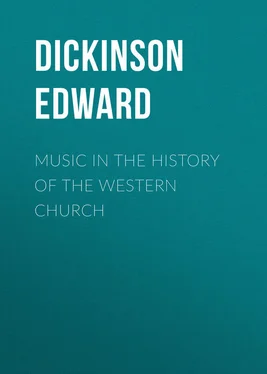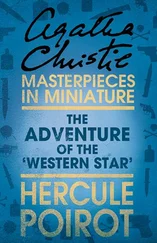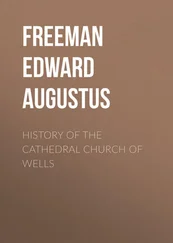Edward Dickinson - Music in the History of the Western Church
Здесь есть возможность читать онлайн «Edward Dickinson - Music in the History of the Western Church» — ознакомительный отрывок электронной книги совершенно бесплатно, а после прочтения отрывка купить полную версию. В некоторых случаях можно слушать аудио, скачать через торрент в формате fb2 и присутствует краткое содержание. Жанр: foreign_antique, foreign_prose, на английском языке. Описание произведения, (предисловие) а так же отзывы посетителей доступны на портале библиотеки ЛибКат.
- Название:Music in the History of the Western Church
- Автор:
- Жанр:
- Год:неизвестен
- ISBN:нет данных
- Рейтинг книги:4 / 5. Голосов: 1
-
Избранное:Добавить в избранное
- Отзывы:
-
Ваша оценка:
- 80
- 1
- 2
- 3
- 4
- 5
Music in the History of the Western Church: краткое содержание, описание и аннотация
Предлагаем к чтению аннотацию, описание, краткое содержание или предисловие (зависит от того, что написал сам автор книги «Music in the History of the Western Church»). Если вы не нашли необходимую информацию о книге — напишите в комментариях, мы постараемся отыскать её.
Music in the History of the Western Church — читать онлайн ознакомительный отрывок
Ниже представлен текст книги, разбитый по страницам. Система сохранения места последней прочитанной страницы, позволяет с удобством читать онлайн бесплатно книгу «Music in the History of the Western Church», без необходимости каждый раз заново искать на чём Вы остановились. Поставьте закладку, и сможете в любой момент перейти на страницу, на которой закончили чтение.
Интервал:
Закладка:
As we turn to the subject of music in ancient religious rites, we find that where the dance had already reached a high degree of artistic development, music was still in dependent infancy. The only promise of its splendid future was in the reverence already accorded to it, and the universality of its use in prayer and praise. On its vocal side it was used to add solemnity to the words of the officiating priest, forming the intonation, or ecclesiastical accent, which has been an inseparable feature of liturgical worship in all periods. So far as the people had a share in religious functions, vocal music was employed by them in hymns to the gods, or in responsive refrains. In its instrumental form it was used to assist the singers to preserve the correct pitch and rhythm, to regulate the steps of the dance, or, in an independent capacity, to act upon the nerves of the worshipers and increase their sense of awe in the presence of the deity. It is the nervous excitement produced by certain kinds of musical performance that accounts for the fact that incantations, exorcisms, and the ceremonies of demon worship among savages and barbarians are accompanied by harsh-sounding instruments; that tortures, executions, and human sacrifices, such as those of the ancient Phoenicians and Mexicans, were attended by the clamor of drums, trumpets, and cymbals. Even in the Hebrew temple service the blasts of horns and trumpets could have had no other purpose than that of intensifying emotions of awe and dread.
Still another office of music in ancient ceremony, perhaps still more valued, was that of suggesting definite ideas by means of an associated symbolism. In certain occult observances, such as those of the Egyptians and Hindus, relationships were imagined between instruments or melodies and religious or moral conceptions, so that the melody or random tone of the instrument indicated to the initiate the associated principle, and thus came to have an imputed sanctity of its own. This symbolism could be employed to recall to the mind ethical precepts or religious tenets at solemn moments, and tone could become a doubly powerful agent by uniting the effect of vivid ideas to its inherent property of nerve excitement.
Our knowledge of the uses of music among the most ancient nations is chiefly confined to its function in religious ceremony. All ancient worship was ritualistic and administered by a priesthood, and the liturgies and ceremonial rites were intimately associated with music. The oldest literatures that have survived contain hymns to the gods, and upon the most ancient monuments are traced representations of instruments and players. Among the literary records discovered on the site of Nineveh are collections of hymns, prayers, and penitential psalms, addressed to the Assyrian deities, designed, as expressly stated, for public worship, and which Professor Sayce compares to the English Book of Common Prayer. On the Assyrian monuments are carved reliefs of instrumental players, sometimes single, sometimes in groups of considerable numbers. Allusions in the Bible indicate that the Assyrians employed music on festal occasions, that hymns to the gods were sung at banquets and dirges at funerals. The kings maintained bands at their courts, and provided a considerable variety of instruments for use in the idol worship. 5 5 A full account of ancient Assyrian music, so far as known, may be found in Engel’s Music of the Most Ancient Nations .
There is abundant evidence that music was an important factor in the religious rites of Egypt. The testimony of carved and painted walls of tombs and temples, the papyrus records, the accounts of visitors, inform us that music was in Egypt preëminently a sacred art, as it must needs have been in a land in which, as Ranke says, there was nothing secular. Music was in the care of the priests, who jealously guarded the sacred hymns and melodies from innovation and foreign intrusion. 6 6 “Long ago they [the Egyptians] appear to have recognized the principle that their young citizens must be habituated to forms and strains of virtue. These they fixed, and exhibited the patterns of them in their temples; and no painter or artist is allowed to innovate upon them, or to leave the traditional forms and invent new ones. To this day no alteration is allowed either in these arts, or in music at all.” – Plato, Laws , Book II., Jowett’s translation.
In musical science, knowledge of the divisions of the monochord, systems of keys, notation, etc., the Egyptians were probably in advance of all other nations. The Greeks certainly derived much of their musical practice from the dwellers on the Nile. They possessed an extensive variety of instruments, from the little tinkling sistrum up to the profusely ornamented harp of twelve or thirteen strings, which towered above the performer. From such an instrument as the latter it would seem as though some kind of harmony must have been produced, especially since the player is represented as using both hands. But if such were the case, the harmony could not have been reduced to a scientific system, since otherwise a usage so remarkable would not have escaped the attention of the Greek musicians who derived so much of their art from Egypt. Music never failed at public or private festivity, religious ceremony, or funeral rite. As in all ancient religions, processions to the temples, carrying images of the gods and offerings, were attended by dances and vocal and instrumental performances. Lyrical poems, containing the praises of gods and heroes, were sung at public ceremonies; hymns were addressed to the rising and setting sun, to Ammon and the other gods. According to Chappell, the custom of carolling or singing without words, like birds, to the gods existed among the Egyptians, – a practice which was imitated by the Greeks, from whom the custom was transferred to the Western Church. 7 7 Chappell, History of Music .
The chief instrument of the temple worship was the sistrum, and connected with all the temples in the time of the New Empire were companies of female sistrum players who stood in symbolic relations to the god as inmates of his harem, holding various degrees of rank. These women received high honors, often of a political nature. 8 8 Erman, Life in Ancient Egypt , translated by Tirard.
In spite of the simplicity and frequent coarseness of ancient music, the older nations ascribed to it an influence over the moral nature which the modern music lover would never think of attributing to his highly developed art. They referred its invention to the gods, and imputed to it thaumaturgical properties. The Hebrews were the only ancient cultivated nation that did not assign to music a superhuman source. The Greek myths of Orpheus, Amphion, and Arion are but samples of hundreds of marvellous tales of musical effect that have place in primitive legends. This belief in the magical power of music was connected with the equally universal opinion that music in itself could express and arouse definite notions and passions, and could exert a direct moral or immoral influence. The importance ascribed by the Greeks to music in the education of youth, as emphatically affirmed by philosophers and law-givers, is based upon this belief. Not only particular melodies, but the different modes or keys were held by the Greeks to exert a positive influence upon character. The Dorian mode was considered bold and manly, inspiring valor and fortitude; the Lydian, weak and enervating. Plato, in the second book of the Laws , condemns as “intolerable and blasphemous” the opinion that the purpose of music is to give pleasure. He finds a direct relation between morality and certain forms of music, and would have musicians constrained to compose only such melodies and rhythms as would turn the plastic mind toward virtue. Plutarch, in his discourse concerning music in his Morals , says: “The ancient Greeks deemed it requisite by the assistance of music to form and compose the minds of youth to what was decent, sober, and virtuous; believing the use of music beneficially efficacious to incite to all serious actions.” He even goes so far as to say that “the right moulding of ingenuous manners and civil conduct lies in a well-grounded musical education.” Assumptions of direct moral, intellectual, and even pathological action on the part of music, as distinct from an aesthetic appeal, are so abundant in ancient writings that we cannot dismiss them as mere fanciful hyperbole, but must admit that music really possessed a power over the emotions and volitions which has been lost in its later evolution. The explanation of this apparent anomaly probably lies, first, in the fact that music in antiquity was not a free independent art, and that when the philosophers speak of music they think of it in its associations with poetry, religious and patriotic observances, moral and legal precepts, historic relations, etc. Music, on its vocal side, was mere emphasized speech inflection; it was a slave to poetry; it had no rhythmical laws of its own. The melody did not convey aesthetic charm in itself alone, but simply heightened the sensuous effect of measured speech and vivified the thought. Mr. Spencer’s well-known expression that “cadence is the comment of the emotion upon the propositions of the intellect” would apply very accurately to the musical theories of the ancients. Certain modes (that is, keys), on account of convenience of pitch, were employed for certain kinds of poetical expression; and as a poem was always chanted in the mode that was first assigned to it, particular classes of ideas would come to be identified with particular modes. Associations of race character would lead to similar interpretation. The Dorian mode would seem to partake of the sternness and vigor of the warlike Dorian Spartans; the Lydian mode and its melodies would hint of Lydian effeminacy. 9 9 See Plato, Republic , book iii.
Instrumental music also was equally restricted to definite meanings through association. It was an accompaniment to poetry, bound up with the symbolic dance, subordinated to formal social observances; it produced not the artistic effect of melody, harmony, and form, but the nervous stimulation of crude unorganized tone, acting upon recipients who had never learned to consider music as anything but a direct emotional excitant or an intensifier of previously conceived ideas.
Интервал:
Закладка:
Похожие книги на «Music in the History of the Western Church»
Представляем Вашему вниманию похожие книги на «Music in the History of the Western Church» списком для выбора. Мы отобрали схожую по названию и смыслу литературу в надежде предоставить читателям больше вариантов отыскать новые, интересные, ещё непрочитанные произведения.
Обсуждение, отзывы о книге «Music in the History of the Western Church» и просто собственные мнения читателей. Оставьте ваши комментарии, напишите, что Вы думаете о произведении, его смысле или главных героях. Укажите что конкретно понравилось, а что нет, и почему Вы так считаете.












